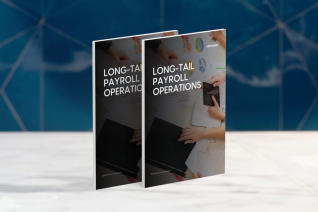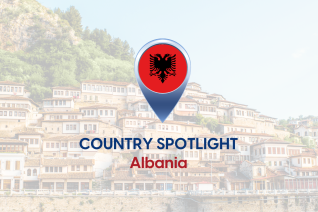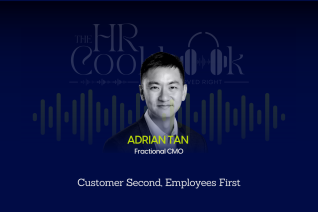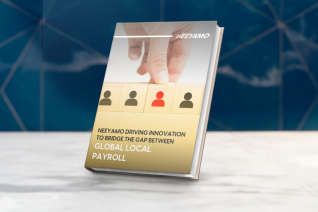Establish your presence globally with Neeyamo as we help you go beyond borders to manage your international payroll and hire new talent in Albania.
Overview
Every evening, Albanians all around their home country leave their homes for a walk down the street to gather and catch up with one another and bask in the energy. This tradition, known as “Xhiro”, is a chance for Albanians to catch up with one another, host barbecues and farmers even use this opportunity to sell their produce. Albania is mostly known for its welcoming and loyal population, but it also possesses a fiercely talented and skilled workforce.
Do your organization’s expansion plans require you to hire employees in Albania? Do you lack a physical entity in the country – a key requisite to hire local talent? Neeyamo's Global Payroll Solutions and Employer of Record services assist organizations worldwide with onboarding and managing employees in Albania -processing payroll, managing local compliance requirements, benefits, and more.
Tools And Instances
Facts And Stats
Capital
Tirana (Tirane)
Currency
Albania Lek (ALL)
Official Language
Albanian
Fiscal Year
1 January - 31 December
Date Format
DD/MM/YYYY
Country Calling Code
+355
Other Languages
Southern Tosk and Northern Gheg
Time Zone
UTC+2:00
Global Payroll
Overview
Handling payroll for a widespread workforce can pose a significant challenge for any organization, and the added complication of compliance can make things worse. If companies spend more time processing payroll, it directly impacts day-to-day operations and their overall productivity.
Over the years, Neeyamo has observed these complexities and strived to provide a global payroll solution through a single technology platform - Neeyamo Payroll.
What is a Payroll System?
A payroll system is a software that is used to manage employee payments, inclusive of their wages, deductions, bonuses, etc.
What is Payroll Tax?
Payroll tax is the percentage amount retained from an employee's salary and paid to the government to invest in the general population's welfare. These are statutory in nature and are levied from both the employer and employee. Additional statutory contributions are made by employers towards aiding both short-term and long-term benefits for their employees.
Employee Taxes
Social insurance contribution - 9.5%
Health insurance contribution - 1.7%
Total: 11.20%
|
Up to ALL 30,000 per month |
0% |
|
ALL 30,001 – ALL 150,000 |
13 % of the amount over ALL 30,000 |
|
Above 150,000 |
ALL 15,600 + 23% of amount over ALL 150,000 |
Employer Taxes
- Social insurance contribution - 15%
-
Health insurance contribution - 1.7%
Total - 16.70%
Payroll Cycle
Overview
Undoubtedly, payroll is a critical process for any organization. Pay cycle in Albania refers to the period for which an organization pays its employees, and this can vary depending on the pay frequency that the organization chooses to adopt.
Frequency
The payroll cycle in Albania is generally a monthly cycle, with wages paid by the last working day of each month.
13th Month Cycle
There is no statutory requirement to pay on the 13th or 14th month.
Global Work
Overview
What is Employer of Record?
An Employer of Record (EOR) service provider helps you eliminate the hassle of handling complexities while onboarding a new employee in an international location. They help bridge the gap that otherwise mandates organizations to have a locally registered entity and a local bank account before making a job offer to an international hire.
An EOR service provider acts as a legal employer, facilitates salary payments, and manages other statutory requirements such as health insurance, payroll taxes, and employee benefits, ensuring compliance with local tax laws and regulations.
This allows organizations to focus on collaborating with the employee in Albania for operational tasks, with the knowledge that they have a cost-effective solution to support their global payroll & HR requirements as they continue their global expansion.
Neeyamo using its Cloud-based HR and Payroll services strives to provide its customers with a seamless employee management experience and offers employer of record as well with our Global Payroll Technology Stack.
HR Mandates and Practices
Minimum Wage
From April 1, 2023, the national minimum wage in Albania is 40,000 ALL.
Overtime
Any work done for more than 40 hours will qualify as overtime, which is compensated at 125% of the regular wage. The employer can compensate employees who work on weekends and public holidays at 150% of their usual salary. Instead of paying the employee more, the business may choose to give them time off.
Data Retention Policy
Employee personal data should be held in private physical or electronic files. Generally, such data should be retained until the termination of the employment relationship.
However, certain personal data, such as salaries and other work-related benefits, personal income tax, social security, and health contributions paid for employees, should be kept for five years as a requirement of the tax legislation.
Regarding work-related accidents and illness, employers should keep a separate registry that should be kept for five years. After the lapse of such a term, the registry is archived at the Regional Directory of Social Security.
Hiring and Onboarding Requirements
Hiring
Preference and discrimination
Discrimination in employment is prohibited. This also applies to the recruitment process, which means that the text for vacancies may not include discriminatory requirements. Albanian labor law does not contain mandated preferences in hiring. However, the parliament recently agreed to a 30 percent quota for women on the supervisory board of market-listed Albanian companies.
Whether the government will implement the quota in legislation is not yet clear. An employer may only hire an employee(s) who meets the minimum employment age required by the Albanian Legislation, which according to Article 98 of the Albanian Labor Code, is 16. The employer should notify the relevant tax authorities about the newly hired employee at least 48 (forty-eight) hours before the commencement of the employment relationship. Furthermore, the employer must declare the newly hired employee at the relevant Labor Office when such an employment relationship begins.
Onboarding
Onboarding Data/Documents:
- Candidate Full Name
- Address
- Nationality
- Date of Birth
- Contact number
- Copy of Identification Card
- Educational Details
- Previous Employment Details
- Copy of Passport (Expats)
- Work Permit (Expats)
Probation
- The first 3 months of work are considered a probation period, except for the cases where the parties have entered into a contract to carry out the same work.
- The probation period may be reduced or removed through a written agreement or a collective contract.
- During the probation period, each party may terminate the contract by informing the other about its decision at least five days in advance.
Leave
Public Holidays
There are 15 public holidays (Official Holidays). If a non-working public holiday happens during the weekend, the Monday after would be a holiday.
Official Holidays:
- January 1-2: New Year's Day
- March 14: Summer Day
- March 22: Nevruz Day
- March 31: Id-al-Fitr
- April 20: Easter (Catholic), Orthodox Easter Day
- April 21: Orthodox Easter Monday, Easter Monday
- May 1: Labour Day
- June 7: Eid Al Adha
- September 5: Saint Teresa Canonsisation Day
- November 22: Alphabet Day
- November 28: Independence Day
- November 29: Liberation Day
- December 8: National Youth Day
- December 25: Christmas Day
Annual Leave
The minimum annual leave entitlement has been increased from four calendar weeks to 22 business days, effective August 9, 2024.
Sick Leave
For up to 14 days, the employer must provide at least 80% of the employee's income without the benefit of social insurance. When sick leave exceeds 14 days, the additional days are covered by social insurance for a maximum of 6 months. If they have been covered for up to 10 years, employees on sick leave are entitled to 70% of their average daily net wage from the previous six months and 80% if they have been protected for more than 10 years.
Maternity Leave
After working continuously for a year, a person is eligible for maternity leave. 35 days of leave before the delivery and 63 days following the birth. 390 days of maternity leave are given to mothers who give birth to multiple children. The employer must either promise 2 hours of paid leave each day for a year (to feed the baby) or reduce the workday by 2 hours without affecting pay if a woman wishes to return to the workforce after the first 63 days.
Parental Leave
After working continuously for a year, a person is eligible for parental leave. An employee is entitled to 15 days of paid leave each year for children under three, while children over three are entitled to 12 days. A worker may also take an extra 30 days of unpaid leave each year.
Other Leave
Bereavement leave: Employees are granted 10 days of absence in the case of the death of a spouse or close family member.
Marriage leave: In the event of an employee’s marriage, the employee can take five days’ leave.
Paternity Leave
There is currently no statutory paternity leave in Albania. Fathers to be entitled to three days of paid leave.
Termination
Notice Period
Following should be the notice requirements:
- 1 month notice during the first two years of employment
- 2 month notice during 2 to 5 years of employment
- 3 month notice after 5 years of employment
Severance Pay
A worker is entitled to 15 days of severance compensation if they have worked for the company for over three years. The employee must then be promptly removed from the employer's payroll and firm by the employer after notifying the Labor Office and Tax Office.
Visa
Anyone who wishes to work in Albania for a period longer than three months but is not an Albanian citizen must apply for a work permit. Before beginning a job, employees must complete their work permit applications. Typically, permission or denial is received no later than 30 days after the documentation is completed. Although specific work licenses include time limits, the total validity of the permit varies depending on the category.
There are four main Albanian work permit categories:
- Type A: Permits for economic activities for both employers and employees
- Type B: Independent economic activity permits
- Type C: Permits for special occasions
- Type D: Permanent work permits for eligible foreigners. All foreigners also need a visa to enter Albania and a residence permit to live there.
Employee Background Checks
Legal and Background Checks
-
Background checks can be done by employers in Albania but are strictly regulated by the EU General Data Protection Regulation. The employer must have a legitimate reason for the check, the check must be necessary, and the employee must be informed before and after the check. The results of the check may only be saved for the period necessary for the screening.
-
Regarding certain functions, an employer can ask the applicant to request a certificate of good behavior at the Ministry for Security and Justice, which declares that the applicant has not committed criminal offenses that are relevant to the performance of the work.
-
Background checks can be outsourced to third parties, but the applicant must be informed about this.
Last updated on December 24, 2024
If you have any queries or suggestions, reach out to us at irene.jones@neeyamo.com
Have Queries? Get In Touch With Us
Get in touch with one of our experts and take a quick demo of our services








